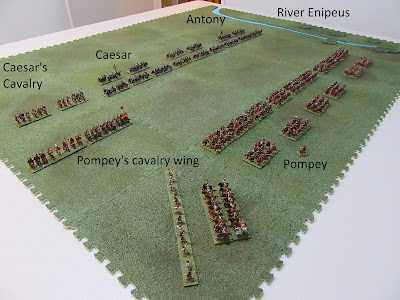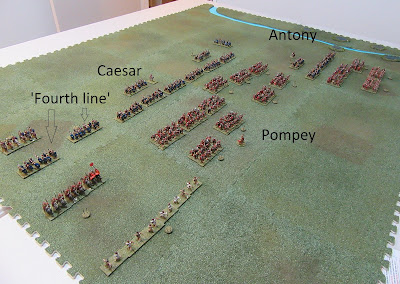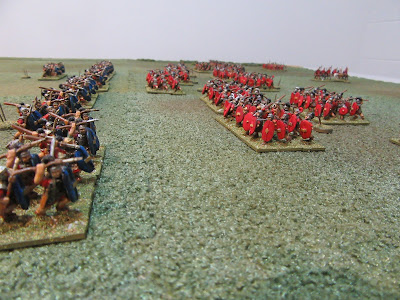To continue the game series started last week SP and I got together Saturday for round two of Pharsalus. You can read about the first battle on the link above, but to recap, while Caesar won the battlefield victory after surrounding and routing the Pompeians, SP did enough damage to Caesar's veterans to win the game 106 to 101.
For round two we swapped sides - this time SP would take Caesar. Pompey's cavalry wing again commenced the fight with a successful charge, and again Pompey refused his right. Caesar advanced judiciously, took the flip flop on turn three, but failed to make much headway in the initial exchanges.
 |
| The initial clash of cavalry (Caesar's to the left; Pompey's to the right). The prize, the Washbourn Trophy, sits in all its glory in the background. |
This changed on turn four, where a succession of successful attacks against Pompey's wing and centre caused nervous flutters on the other side of the table. Pompey's men replied in kind and by the end of the turn both sides had lost a unit in the cavalry fight.
 |
| The lines meet. |
From turn five onwards Caesar's veterans began to exert their dominance. Pompey's troops suffered mounting attrition, but were able to manage to inflict some damage of their own.
Pompey's wing gave way on turn 6, allowing Caesar to get in behind the Pompeian line and lower the morale rating of Pompey's own zone, which routed soon after. Elsewhere, Antony struggled to make much of an impact against the determined resistance and ferocious attacks of the Pompeian right.
 |
| Pompey's zone about to rout in the foreground. |
With time almost up, the Pompeian centre routed, leaving just the right on the field. But they were still largely untouched, and fighting a wholly spent Antony.
 |
| The end is near for the Pompeian centre. |
Antony lost a unit shattered and was only saved for further embarrassment by a determined attack on the part of the veteran cavalry into the flank of the Pompeian legionaries on the final turn of the game.
 |
| The fighting by the river is vicious. |
At this the remaining Pompeians routed and it was time to check the scores.
Caesar had done 96 points of damage to 72 by Pompey. When the handicap was added on, it was found that Pompey had won the game by 102 points to 96.
When the scores of the two games were summed, it turned out that SP had managed 202 across the two battles to yours truly's 203, meaning that the Washbourn Trophy came back to its rightful home by the closest of margins.
I was a little surprised to win a game victory here. We only shattered two units, but the difference was that we routed after eight units were shattered, whereas in the first game Caesar had shattered ten units in his win. This seemingly minor difference was reflected in the points scored, and shows how tight the margins can be under the Lost Battles handicap system.
So, a fine pair of games, and a good way to introduce SP to brilliant generals.


